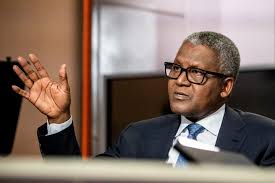Nigerian billionaire Aliko Dangote has emphasized that it is time for Nigeria to end its long-standing fuel subsidies. This call comes as his new mega refinery near Lagos begins production, potentially alleviating the country’s reliance on imported gasoline.

During an interview, Dangote pointed out that the subsidy issue is sensitive. He explained, “When you subsidize a product, it can lead to inflated prices, resulting in the government paying more than needed.” Given the current economic environment, he believes now is the right moment to remove these subsidies.
Nigeria, Africa’s largest oil producer, found itself heavily dependent on imported fuel until Dangote’s refinery began operations this month. The government has been inching closer to eliminating these costly subsidies, which amounted to $10 billion in 2022 alone. After President Bola Tinubu removed the subsidy in May 2023 to combat rising costs, the move initially led to protests due to the spike in living expenses. However, the government reinstated the subsidy amid ongoing inflation.
Recently, the Nigerian government took a slight step toward subsidy removal by easing the price cap on gasoline, although it remains below the market level. Dangote indicated that the end of gasoline imports could have significant benefits for the economy, particularly in stabilizing the naira.
The naira has lost around 70% of its value against the U.S. dollar after the lifting of currency restrictions last year. This decline has been exacerbated by a shortage of dollars in the Nigerian foreign exchange market. Dangote pointed out that petroleum products account for approximately 40% of Nigeria’s foreign exchange expenditure. Therefore, by supplying fuel domestically from his refinery, which began selling gasoline to the state-owned oil company on September 15, Nigeria could reduce its dependence on dollars and stabilize its currency.
Cheta Nwanze, a partner at the research firm SBM Intelligence, explained that if Dangote can help halve Nigeria’s import bill for fuels, it will have a substantial positive impact on the economy.
The complexities of removing subsidies are many, and the debate continues on the best path forward for Nigeria. However, with Dangote’s refinery now operational, the prospects of decreasing reliance on fuel imports and stabilizing the naira seem more feasible. The discussions about subsidy removal are not just economic; they reflect a larger need for reform in Nigeria’s financial policies, aiming for a more sustainable and self-sufficient economy.
Insights from prominent figures like Aliko Dangote may shape the country’s approach to fuel subsidies and the potential for a more resilient economy. Ending fuel subsidies could pave the way for greater financial stability, but it will require careful management and communication with the public to ensure social stability.



